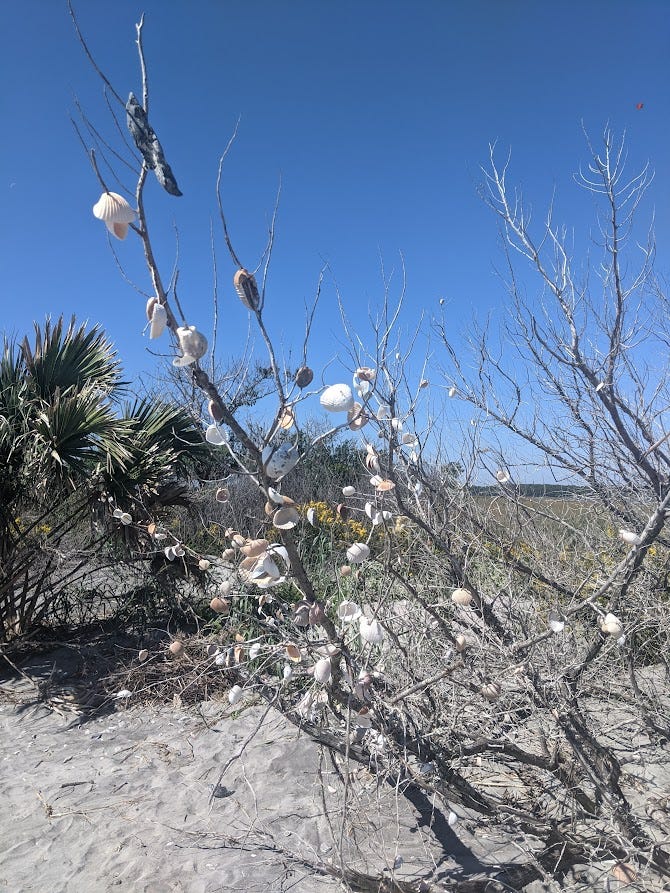

Discover more from Write More, Be Less Careful
Welcome to Write More! This is the your mid-month pop-in, which comes with ideas, encouragement, and writing prompts to keep you going. I also send out a monthly intentions email on the last Sunday before a new month starts that aims to help you think through your goals and intentions for your writing practice in the coming month and to reflect on your progress in the previous month.
(We’ve got a ton of new subscribers recently! Welcome! I’m so glad you’re here.)
If that sounds helpful and fun, subscribe here.
Hello, all! Today’s newsletter will be a quick one. I wanted to offer a revision prompt based on a snippet of the wonderful Ross Gay interview in the new Poets & Writers.
If you’re not familiar with Ross Gay’s work, or if you just need a little moment of wonder in your day, this 4-minute video will give you a lovely introduction. (And if you have a little more time, this Commonplace interview is well worth a listen. I can’t always stick with a long poem when it’s on the page, but hearing Gay read his—these are poems from his Catalog of Unabashed Gratitude—is genuinely a delight.) (I couldn’t help myself. It’s true.)
He’s got a lot to say in this interview, about joy and gardening and his new book, Inciting Joy. The piece I wanted to share with you all is about workshop. In a discussion about the stultifying effects of grades and how his own pedagogy has moved away from trying to help students produce good writing, he says:
I’m no longer interested in someone submitting their poem or whatever to be scrutinized, which often really means shaving off all the weird edges, the stuff we don’t yet know how to understand. I’m glad to ask good, provocative questions of what we write, but I can’t really stand how we used to submit our poems to the scalpels and hatchets of our classmates, many of whom, first of all, don’t have a long relationship with the work they’re hatcheting, and many of whom, secondly, are very new at this. They’re like babies with hatchets, which is cute but very dangerous.
Has anyone else been in a workshop like that, full of babies with hatchets? (Or: have you taught a workshop where you worried you were the baby with the hatchet, not yet equipped to really help with the draft, but feeling obligated to do something?)
Or: who’s brought baby-with-a-hatchet energy to their own revision process? Who’s smoothed out all the rough bits and produced something that, in the end, was competent but boring?
(That’s me, at the front of the room, abashedly raising my hand. No, make that both hands.)
You can help other people find this newsletter by clicking the little heart at the top or bottom of this email.
So, today, a revision prompt, to counter all that hatcheting and refining:
instead of making it good, let’s make it weird
The kind of weirdness I’m thinking about is linked to porousness, by which I mean that, instead of excising all the things that have cropped up in a draft and seem not to fit, you might instead think about how those odd bits and bobs could help you let something else in. By way of example, Camille Guthrie’s poem “Diamonds,” from her smart and genuinely hysterical book by the same name, which starts by invoking Judith Butler as she unloads the dishwasher (a task I also hate!), and keeps getting weirder and more surprising from there. One snippet showing the scope of the poem:
Judith, Michel, I’m calling on you
I think I’m stuck in Hamlet
in the role of Queen Gertrude
but not at all royal I’m from Pittsburgh
What I love here is the mix of high/low culture references—Judith Butler, Michel Foucault, Shakespeare alongside Pittsburgh (a city that’s gotten hipper since Camille and I lived there but is still decidedly unroyal) and, elsewhere in the poem, a mobile game with a little green monster, Rhianna, laundry folding. That’s the kind of porousness I love—a poem that keeps letting in more and more of the world.
A few ideas for revising into weirdness:
As you revise, look for the parts that don’t fit. That might be textual—words that feel like they’re in a different register, or belong to a different world—or it might be conceptual, with a new idea appearing mid-text. Instead of slicing those parts out, think about how you can lean into them. Instead of honing the text so all the parts fit precisely, add more jagged edges or surprising turns.
You can also think about what you can add to make the writing weirder. Try injecting a fact, a favorite word, a bit of etymology. And if all else fails, you can always work some magic. One of my poems from Double Jinx begins “the year my sister turned into a crow,” and I’ve recently been reminded of the surreal transformations of Russell Edson’s work, like this poem, “Sweet Tooth,” which begins “A little girl made of sugar and spice and everything nice was eaten by someone with a sweet tooth the size of an elephant’s tusk.”
What tricks have you used to keep from revising the weirdness out of your work?
Write More, Be Less Careful is a newsletter about why writing is hard & how to do it anyway. I’ll be back on Sunday to talk about setting intentions for your writing practice in November. In the meanwhile, you’re always welcome to reply to this email, comment below, or find me on twitter (@nancy_reddy) and instagram (@nancy.o.reddy).
If you’ve enjoyed this newsletter, I’d love it if you would share it or send it to a friend.
















Thank you. Thank you. Currently reading a book about psychoanalysis and maternal “interruption” and thinking so much about this in my own writing and writing process, especially v/v what editorialized writing (and “perfect prose”) teaches us about patriarchy, power structures, race, class and more.